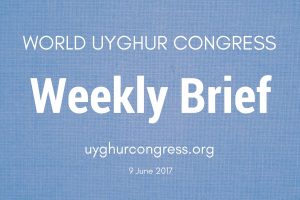Weekly Brief June 9th

World Uyghur Congress, 9 June 2017

Chinese Cadres Move in With Families During Ramadan
After reports to the World Uyghur Congress had already surfaced, Radio Free Asia (RFA) reported this week that Chinese officials have been embedded in the homes of Uyghur families in East Turkestan. Officials in Hotan prefecture said that the local government has assigned Chinese Communist Party cadres to each Uyghur family for monitoring purposes.
The Hotan government has launched a campaign called “Together in Five Things” in which the officials will stay with the family for up to 15 days to make sure the residents neither fast nor pray. The arrangement also involves the officials inspecting the households after sunset each day who then report to higher officials.
One officer who was contacted by RFA was quoted as saying, “It’s all about keeping close to the people. During this period, they [officials] will get to know the lives of the people, assist in their daily activities—such as farming—and propagate laws and regulations, party and government ethnic and religious policies, and so on.”
Sources also told RFA that civil servants and government retirees who draw a pension have been forced to sign a document pledging that they will not fast or pray during Ramadan. In addition, those signing the pledge must also ensure that family members and friends do not pray or fast as well.
The move comes after China has imposed even harsher restrictions on religious practices during the holy month of Ramadan, as it has over the last ten years. Students, teachers, public service employees and party members have already been prohibited from fasting and restaurants have been forced to remain open during daylight hours.
China Doubles Down on Religious Name Bans
In the midst of Ramadan, authorities in East Turkestan have recently extended a ban on the use of Muslim names for Uyghurs. Uyghur children under the age of 16—the age at which they are granted an identity card—are now being forced to change their “religious” names pursuant to a more vague ban for younger children along the same lines that was announced in late April of this year.
The Xinjiang Uyghur Autonomous Region’s Public Security Bureau posted Order No. 4425 requiring all Uyghur parents to change the names of children under 16 years of age, if they are among those listed in a region-wide ban. Radio Free Asia also speculated that the prohibition “may soon include Uyghurs of all ages.”
A list of 29 names including including Islam, Quran, Mecca, Jihad, Imam, Saddam, Hajj, Medina and Arafat have been prohibited in an ostensible effort to crackdown on “extremism” in the region. China’s recently implemented “Regulation on De-extremification” serves as the pretext for the new policy as Article 9 specifies a long list of “words and actions” that may be considered extremism including “[S]preading religious fanaticism through irregular beards or name selection.”
Other Stories:
Chinese Influence Exposed in Australia
A report headed by the Australian Broadcasting Corporation (ABC) has revealed great efforts undertaken by the Chinese government to influence Australian politicians as well as Chinese students studying abroad in the country. Part of the campaign involves attempts to influence politicians through political donors and to control students on university campuses. Members of the Chinese community in Australia have been monitored and even visited by Chinese intelligence officials in the country.
China Pressing UN to Cut Human Rights Posts
According to Human Rights Watch, China has been pushing, behind closed doors, to de-fund human rights posts within the UN system. Human Rights Officers, “monitor, investigate, and report on alleged abuses, and their presence can deter killings, kidnappings, and other violations,” but China’s negotiators have been looking for support to cut these positions, particularly in the Central African Republic and the Democratic Republic of the Congo.

